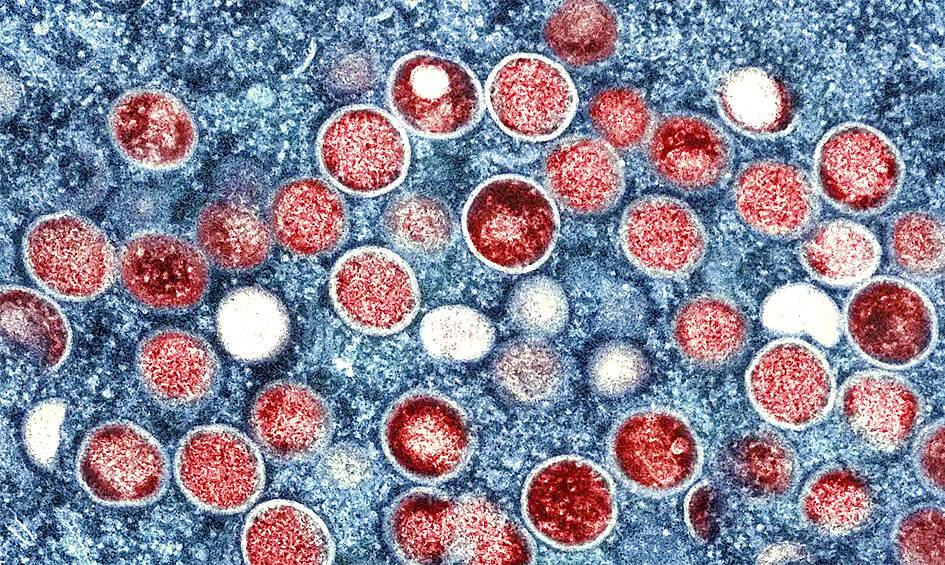A top Chinese health official has warned the public to avoid “skin-to-skin contact with foreigners” to prevent the spread of monkeypox after the nation confirmed its first case.
The person had recently arrived from overseas and is in quarantine, health officials said earlier.
“To prevent possible monkeypox infection and as part of our healthy lifestyle, it is recommended that 1) you do not have direct skin-to-skin contact with foreigners,” Wu Zunyou (吳尊友), chief epidemiologist at the Chinese Center for Disease Control and Prevention (CCDC), wrote in a post on Sina Weibo on Saturday.

Photo: AP
Wu also urged people to avoid skin-to-skin contact with people who had been abroad within the past three weeks, as well as all “strangers.”
He said China’s strict COVID-19 restrictions and tight border controls had so far prevented the spread of monkeypox, and cautioned against allowing cases to “slip through the net.”
His post was widely shared across Chinese social media platforms over the weekend, but the comments section under the initial post was disabled.
Some who commented on forwarded versions or screenshots of his post were concerned Wu’s guidelines could lead to xenophobia, and drew parallels to the violence Asian people overseas faced at the start of the COVID-19 pandemic due to the association of the virus with people of Chinese heritage.
Several wrote that there were foreign workers and long-time residents in China who have not left the country due to COVID-19 restrictions.
“Did someone jump and scream discrimination?” one commentator wrote.
“Does he know that many foreigners have been staying in China for years?” another said.
The patient is a 29-year-old salesman who engaged in male-to-male sex when he visited Berlin this month, the CCDC said in a separate report, adding that he then traveled to Spain before returning to China.
Asked whether the warning is official government policy, Chinese Ministry of Foreign Affairs spokeswoman Mao Ning (毛寧) yesterday said it “is an issue relation to public health” and that it was “not a diplomatic issue.”
Additional reporting by Bloomberg

Intelligence agents have recorded 510,000 instances of “controversial information” being spread online by the Chinese Communist Party (CCP) so far this year, the National Security Bureau (NSB) said in a report yesterday, as it warned of artificial intelligence (AI) being employed to generate destabilizing misinformation. The bureau submitted a written report to the Legislative Yuan in preparation for National Security Bureau Director-General Tsai Ming-yen’s (蔡明彥) appearance before the Foreign Affairs and National Defense Committee today. The CCP has been using cognitive warfare to divide Taiwanese society by commenting on controversial issues such as Taiwan Semiconductor Manufacturing Co’s (TSMC, 台積電) investments in the

INVESTIGATION: The case is the latest instance of a DPP figure being implicated in an espionage network accused of allegedly leaking information to Chinese intelligence Democratic Progressive Party (DPP) member Ho Jen-chieh (何仁傑) was detained and held incommunicado yesterday on suspicion of spying for China during his tenure as assistant to then-minister of foreign affairs Joseph Wu (吳釗燮). The Taipei District Prosecutors’ Office said Ho was implicated during its investigation into alleged spying activities by former Presidential Office consultant Wu Shang-yu (吳尚雨). Prosecutors said there is reason to believe Ho breached the National Security Act (國家安全法) by leaking classified Ministry of Foreign Affairs information to Chinese intelligence. Following interrogation, prosecutors petitioned the Taipei District Court to detain Ho, citing concerns over potential collusion or tampering of evidence. The

‘COMPREHENSIVE PLAN’: Lin Chia-lung said that the government was ready to talk about a variety of issues, including investment in and purchases from the US The National Stabilization Fund (NSF) yesterday announced that it would step in to staunch stock market losses for the ninth time in the nation’s history. An NSF board meeting, originally scheduled for Monday next week, was moved to yesterday after stocks plummeted in the wake of US President Donald Trump’s announcement of 32 percent tariffs on Taiwan on Wednesday last week. Board members voted to support the stock market with the NT$500 billion (US$15.15 billion) fund, with injections of funds to begin as soon as today. The NSF in 2000 injected NT$120 billion to stabilize stocks, the most ever. The lowest amount it

NEGOTIATIONS: Taiwan has good relations with Washington and the outlook for the negotiations looks promising, Minister of Economic Affairs J.W. Kuo said Taiwan’s GDP growth this year is expected to decrease by 0.43 to 1.61 percentage points due to the effects of US tariffs, National Development Council (NDC) Minister Paul Liu (劉鏡清) said at a meeting of the legislature’s Economics Committee in Taipei yesterday, citing a preliminary estimate by a private research institution. Taiwan’s economy would be significantly affected by the 32 percent “reciprocal” tariffs slapped by the US, which took effect yesterday, Liu said, adding that GDP growth could fall below 3 percent and potentially even dip below 2 percent to 1.53 percent this year. The council has commissioned another institution